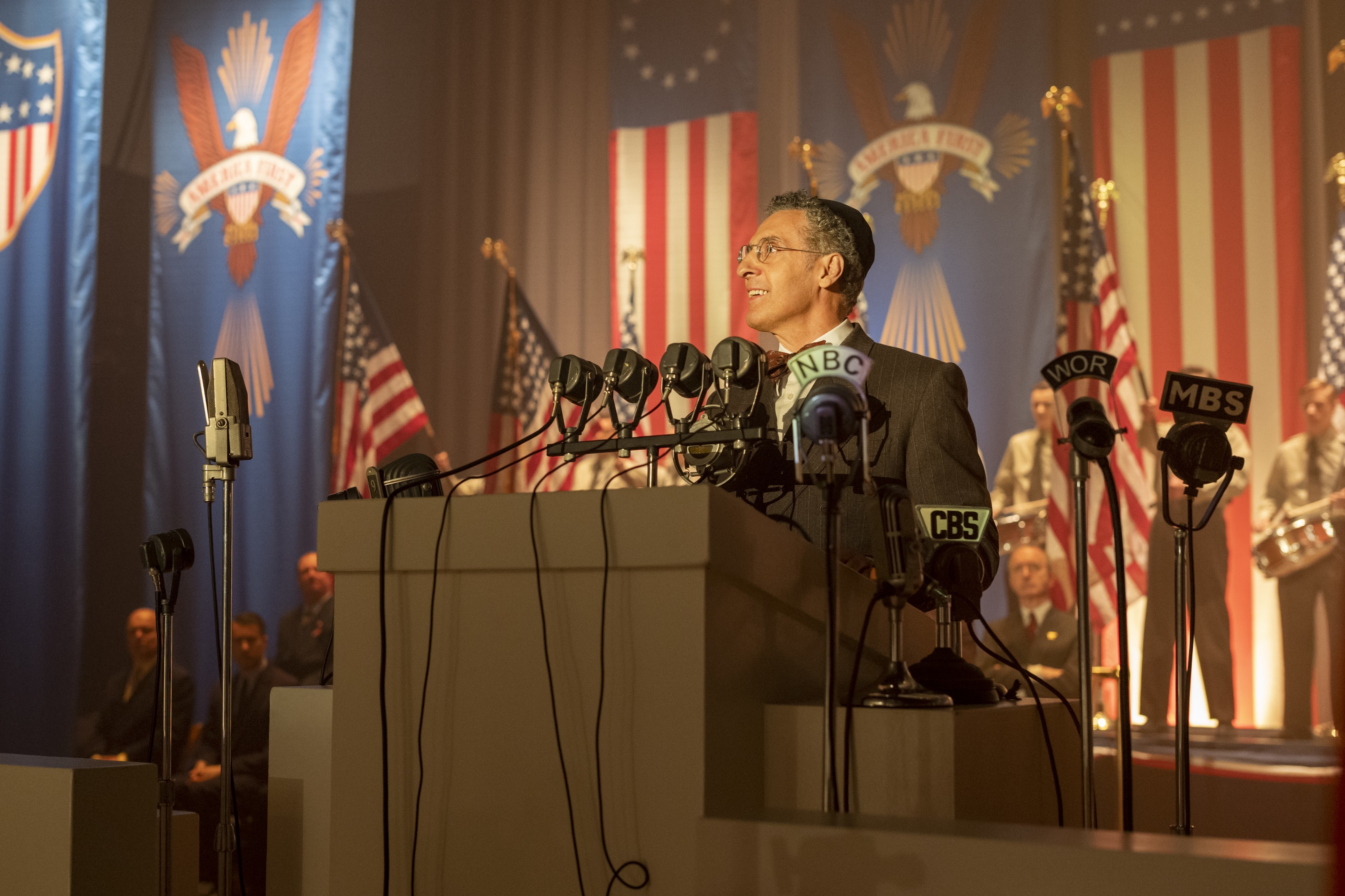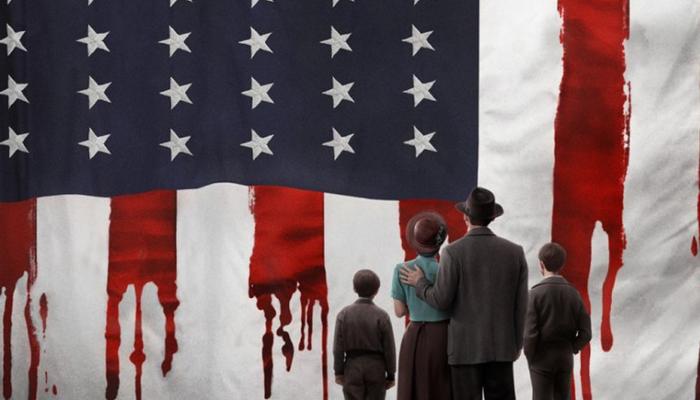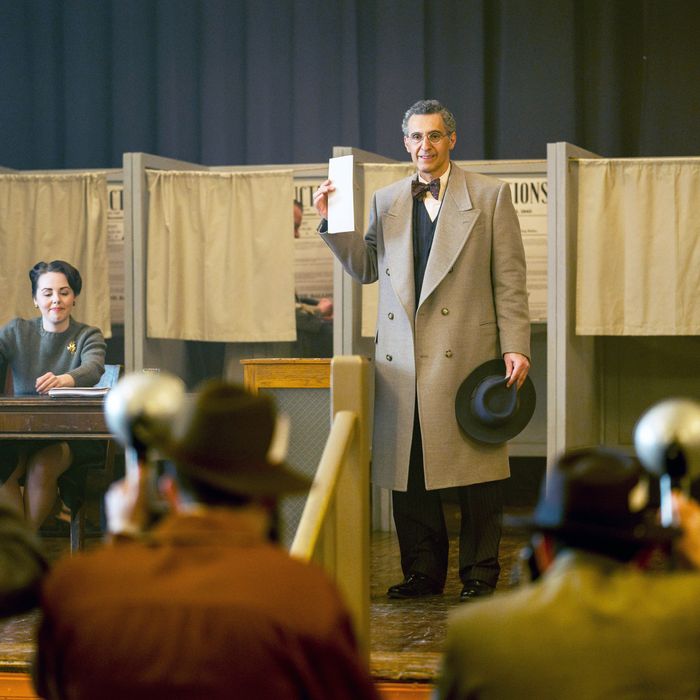The Shadow of Fascism: Exploring HBO’s "The Plot In opposition to America"
Associated Articles: The Shadow of Fascism: Exploring HBO’s "The Plot In opposition to America"
Introduction
On this auspicious event, we’re delighted to delve into the intriguing matter associated to The Shadow of Fascism: Exploring HBO’s "The Plot In opposition to America". Let’s weave attention-grabbing info and supply contemporary views to the readers.
Desk of Content material
The Shadow of Fascism: Exploring HBO’s "The Plot In opposition to America"

HBO’s "The Plot In opposition to America," a miniseries primarily based on Philip Roth’s 2004 novel, is not only a historic drama; it is a chillingly prescient exploration of the fragility of democracy and the seductive energy of demagoguery. Set within the Forties, the sequence presents an alternate historical past the place aviator and charismatic populist Charles Lindbergh defeats Franklin D. Roosevelt within the 1940 presidential election. This seemingly small alteration ripples outwards, remodeling the American panorama and the lives of the Roth household, the present’s central focus, in profound and unsettling methods.
The sequence masterfully crafts a way of unease, constructing a world that’s each acquainted and deeply disturbing. We see the recognizable components of Forties America – the bustling streets of Newark, New Jersey, the household dinners, the anxieties of wartime – however these are subtly warped by the creeping affect of Lindbergh’s isolationist and anti-Semitic agenda. As an alternative of combating fascism overseas, America finds itself more and more seduced by its home equal.
The narrative facilities on the Zuckerman household, a fictionalized model of Philip Roth’s circle of relatives. We comply with the experiences of younger Philip Roth (performed with exceptional sensitivity by Azhy Robertson and later by Caleb Malis), his dad and mom Herman and Bess (Morgan Spector and Zoe Kazan, respectively), and his uncle, the politically astute and more and more involved Sandy (John Turturro). By way of their views, we witness the gradual erosion of American beliefs and the rising concern and uncertainty that permeate their neighborhood.
Lindbergh’s marketing campaign, introduced as a potent mixture of charisma and refined bigotry, is not overtly violent. As an alternative, it is a sluggish burn, a gradual chipping away on the foundations of American society. His speeches, rigorously crafted and delivered with a chilling calm by actor Ben Cole, are crammed with coded language, interesting to anxieties about financial insecurity and nationwide identification. He subtly promotes anti-Semitic sentiments, exploiting present prejudices and fears to solidify his energy base. This isn’t the blatant, in-your-face racism of different historic intervals; it is a extra insidious type of bigotry, woven into the material of on a regular basis life.
The present brilliantly depicts the insidious nature of propaganda. Lindbergh’s supporters aren’t portrayed as cartoonish villains; many are peculiar individuals, swayed by his guarantees and oblivious to the darker implications of his ideology. This nuanced portrayal makes the risk much more terrifying, highlighting the benefit with which seemingly first rate individuals might be manipulated and swept up in a tide of extremism.
The sequence highlights the insidious methods by which anti-Semitism manifests itself on this alternate actuality. It isn’t nearly overt acts of violence; it is concerning the refined types of discrimination, the whispered feedback, the exclusion from alternatives, the rising sense of otherness. The Zuckerman household, as Jewish People, face growing marginalization as Lindbergh’s affect grows. They witness the rise of pro-Lindbergh organizations, the refined but pervasive strain to adapt, and the chilling risk of being pressured to depart their houses and their lives behind.
The present’s power lies in its exploration of the psychological influence of residing below a regime that promotes intolerance. The fixed anxiousness, the concern of talking out, the self-censorship – these are powerfully depicted, making a palpable sense of dread that lingers lengthy after the credit roll. The household dynamics are additionally central to the narrative, showcasing the alternative ways by which every member copes with the altering political panorama. Herman, a pragmatist, initially tries to stay impartial, hoping to climate the storm. Bess, extra politically engaged, turns into more and more vocal in her opposition, placing her household in danger. Sandy, a eager observer of the political scene, gives a vital counterpoint, providing warnings and insights which might be usually ignored. Younger Philip, initially oblivious to the gravity of the scenario, step by step comes to know the hazard they face.
The sequence does not draw back from the complexities of the period. It acknowledges the existence of various opinions and the inner conflicts inside the Jewish neighborhood itself. Some members, fearing for his or her security and safety, are tempted by the attract of appeasement, whereas others actively resist the rising tide of fascism. This inner battle provides one other layer of depth to the narrative, highlighting the troublesome decisions people face when confronted with political extremism.
"The Plot In opposition to America" will not be merely a historic drama; it is a cautionary story, a chilling reminder of the fragility of democracy and the significance of vigilance. By presenting a fictionalized however believable alternate historical past, the sequence forces us to confront uncomfortable truths concerning the nature of energy, the seductive enchantment of demagoguery, and the insidious methods by which prejudice can take root and flourish. The present’s energy lies in its capability to resonate with up to date anxieties, reminding us that the struggle in opposition to fascism, in all its kinds, is a continuing and ongoing wrestle.
The sequence’s ending, whereas not providing a neat decision, leaves a lingering sense of unease and uncertainty. It means that the struggle in opposition to intolerance isn’t really over, and that the seeds of fascism can lie dormant, ready for the appropriate situations to germinate and develop. The refined shifts within the panorama, the gradual erosion of freedoms, and the persistent risk of violence are all powerfully conveyed, leaving the viewer with a profound sense of unease and a renewed appreciation for the significance of democratic values and the continued wrestle to guard them.
In conclusion, "The Plot In opposition to America" is a masterpiece of tv, a gripping and unsettling drama that transcends its historic setting to supply a well timed and related warning concerning the risks of unchecked energy, the seductive attract of populism, and the enduring risk of fascism. It is a sequence that stays with you lengthy after the credit roll, prompting reflection on the fragility of democracy and the significance of remaining vigilant in opposition to the forces that search to undermine it. It is a present that needs to be watched, mentioned, and remembered as a robust testomony to the enduring relevance of historical past and the continued wrestle for justice and equality.








Closure
Thus, we hope this text has supplied helpful insights into The Shadow of Fascism: Exploring HBO’s "The Plot In opposition to America". We recognize your consideration to our article. See you in our subsequent article!